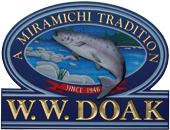Much has been written recently about the Miramichi and the state of its legendary runs of salmon. It is a testimony to the grandeur of this river system that everyone feels compelled to have an opinion about it and it seems we are no exception. However, as Miramichiers, we understand how intricately this river is interwoven into the fabric of our lives and so, for us the stakes are very high.
Some noble worriers have adopted a policy of "turning up the noise level" on salmon concerns and their shrill whine has harmonized well with the hum of the printing press. The willingness of a bloated media to faithfully regurgitate every spoon-fed press release clearly illustrates that "those who fail to learn from hysteria are destined to repeat it." However, those of us who gather our salmon news from where the trees grow rather than where they go take great exception to the serious misrepresentation of our river over the past few years.
The conservation industry is presently walking a perilously fine line. On the one hand, they must continue to reap the "profits of doom" by allowing anglers to assume that their best interests are being served. At the same time they must avoid accusations of angling advocacy and preserve their tax status by appearing to take a rhetorical "hard line" against angling. However, through their repeated criticisms of traditional angling practices and pleas for excessive restraint, the public at large has now taken up the mantra of angling curtailment. The result is increasing calls for greater restrictions coming from those who understand very little of the intricacies of salmon management. Although anglers may be the first target, the salmon resource itself may be the ultimate casualty as we fumble toward management by ideology rather than biology.
Under man's abusive husbandry, nature historically has moved through periods of intense exploitation followed by fits of compensatory worship. Not only is this distorted view of nature offensive to its Creator (Romans 1:25) but it produces a suffocating desire to coddle an earth which is seen as scarred, scared and sacred. This heavily fertilized soil is poor ground in which to cultivate a rational salmon policy. Through sound management and a highly developed angling infrastructure, the Miramichi has distinguished itself by continuing to thrive in stark contrast to many other rivers no longer "touched by an angler." Our exceptionally high parr counts and comparatively steady returns of "multi sea winter" adult salmon are the dividends of years of responsible angling, which is the very epitome of practical conservation. The recreational and economic value imputed to the resource through angling is the primary motivation by which its preservation is assured. The presence of anglers also provides a level of grass roots surveillance and streamside monitoring which ensures that the Miramichi will not be logged, clogged or flogged to extinction.
It has been said that "a zealot is one who has forgotten his purpose and has redoubled his efforts" and this seems an apt description of anyone who would seek to advance the cause of conservation at the expense of legitimate angling. To get this runaway train back on track, we must challenge our organizations to stop cowering behind carefully crafted ambiguities and begin to publicly affirm and defend the legitimacy of angling as a primary conservation tool. Before you make your next contribution, why not ask your conservation group for a written statement of their position on the conservation value of angling. Its time to recognize that the salmon needs your sport as much as your support.
We all agree on the need to save salmon but we disagree profoundly with the madness in this present method. While some may seek to save the salmon from angling and others seek to save the salmon for angling, those who understand the Miramichi know that you will only save the salmon through angling and that is a crucial distinction.
Our salmon rivers deserve the kind of legislative stability and sensible representation that will encourage more people to participate in angling. In so doing, they will become the new "guardian anglers" of practical conservation, not for the good of the local economy, nor for the good of the participants, but for the good of the salmon itself. After all........ ANGLING IS CONSERVATION!
|
MiramichiRiver.com A site dedicated to the decriminalization of traditional angling. Sponsored by  The Miramichi needs a voice, not a spokesman. Link to DFO Recreational Salmon Fishing Survey |
 |
||
|
||
